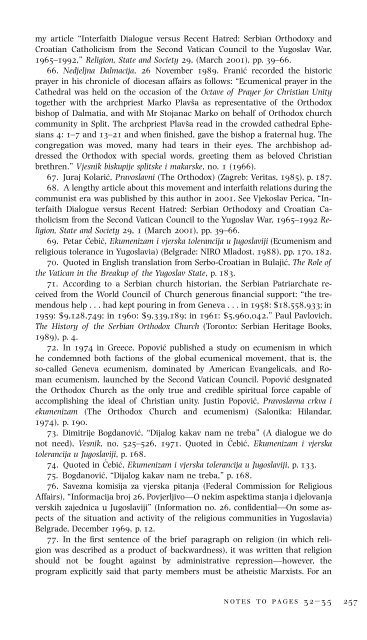Balkan Idols: Religion and Nationalism in Yugoslav States
Balkan Idols: Religion and Nationalism in Yugoslav States
Balkan Idols: Religion and Nationalism in Yugoslav States
Create successful ePaper yourself
Turn your PDF publications into a flip-book with our unique Google optimized e-Paper software.
my article “Interfaith Dialogue versus Recent Hatred: Serbian Orthodoxy <strong>and</strong><br />
Croatian Catholicism from the Second Vatican Council to the <strong>Yugoslav</strong> War,<br />
1965–1992,” <strong>Religion</strong>, State <strong>and</strong> Society 29, (March 2001), pp. 39–66.<br />
66. Nedjeljna Dalmacija, 26 November 1989. Franić recorded the historic<br />
prayer <strong>in</strong> his chronicle of diocesan affairs as follows: “Ecumenical prayer <strong>in</strong> the<br />
Cathedral was held on the occasion of the Octave of Prayer for Christian Unity<br />
together with the archpriest Marko Plavsˇa as representative of the Orthodox<br />
bishop of Dalmatia, <strong>and</strong> with Mr Stojanac Marko on behalf of Orthodox church<br />
community <strong>in</strong> Split. The archpriest Plavsˇa read <strong>in</strong> the crowded cathedral Ephesians<br />
4: 1–7 <strong>and</strong> 13–21 <strong>and</strong> when f<strong>in</strong>ished, gave the bishop a fraternal hug. The<br />
congregation was moved, many had tears <strong>in</strong> their eyes. The archbishop addressed<br />
the Orthodox with special words, greet<strong>in</strong>g them as beloved Christian<br />
brethren.” Vjesnik biskupije splitske i makarske, no. 1 (1966).<br />
67. Juraj Kolarić, Pravoslavni (The Orthodox) (Zagreb: Veritas, 1985), p. 187.<br />
68. A lengthy article about this movement <strong>and</strong> <strong>in</strong>terfaith relations dur<strong>in</strong>g the<br />
communist era was published by this author <strong>in</strong> 2001. See Vjekoslav Perica, “Interfaith<br />
Dialogue versus Recent Hatred: Serbian Orthodoxy <strong>and</strong> Croatian Catholicism<br />
from the Second Vatican Council to the <strong>Yugoslav</strong> War, 1965–1992 <strong>Religion</strong>,<br />
State <strong>and</strong> Society 29, 1 (March 2001), pp. 39–66.<br />
69. Petar Ćebić, Ekumenizam i vjerska tolerancija u Jugoslaviji (Ecumenism <strong>and</strong><br />
religious tolerance <strong>in</strong> <strong>Yugoslav</strong>ia) (Belgrade: NIRO Mladost, 1988), pp. 170, 182.<br />
70. Quoted <strong>in</strong> English translation from Serbo-Croatian <strong>in</strong> Bulajić, The Role of<br />
the Vatican <strong>in</strong> the Breakup of the <strong>Yugoslav</strong> State, p. 183.<br />
71. Accord<strong>in</strong>g to a Serbian church historian, the Serbian Patriarchate received<br />
from the World Council of Church generous f<strong>in</strong>ancial support: “the tremendous<br />
help ...hadkeptpour<strong>in</strong>g <strong>in</strong> from Geneva ...<strong>in</strong>1958: $18,558,933; <strong>in</strong><br />
1959: $9,128,749; <strong>in</strong> 1960: $9,339,189; <strong>in</strong> 1961: $5,960,042.” Paul Pavlovich,<br />
The History of the Serbian Orthodox Church (Toronto: Serbian Heritage Books,<br />
1989), p. 4.<br />
72. In 1974 <strong>in</strong> Greece, Popović published a study on ecumenism <strong>in</strong> which<br />
he condemned both factions of the global ecumenical movement, that is, the<br />
so-called Geneva ecumenism, dom<strong>in</strong>ated by American Evangelicals, <strong>and</strong> Roman<br />
ecumenism, launched by the Second Vatican Council. Popović designated<br />
the Orthodox Church as the only true <strong>and</strong> credible spiritual force capable of<br />
accomplish<strong>in</strong>g the ideal of Christian unity. Just<strong>in</strong> Popović, Pravoslavna crkva i<br />
ekumenizam (The Orthodox Church <strong>and</strong> ecumenism) (Salonika: Hil<strong>and</strong>ar,<br />
1974), p. 190.<br />
73. Dimitrije Bogdanović, “Dijalog kakav nam ne treba” (A dialogue we do<br />
not need), Vesnik, no. 525–526, 1971. Quoted <strong>in</strong> Ćebić, Ekumenizam i vjerska<br />
tolerancija u Jugoslaviji, p. 168.<br />
74. Quoted <strong>in</strong> Ćebić, Ekumenizam i vjerska tolerancija u Jugoslaviji, p. 133.<br />
75. Bogdanović, “Dijalog kakav nam ne treba,” p. 168.<br />
76. Savezna komisija za vjerska pitanja (Federal Commission for Religious<br />
Affairs), “Informacija broj 26, Povjerljivo—O nekim aspektima stanja i djelovanja<br />
verskih zajednica u Jugoslaviji” (Information no. 26, confidential—On some aspects<br />
of the situation <strong>and</strong> activity of the religious communities <strong>in</strong> <strong>Yugoslav</strong>ia)<br />
Belgrade, December 1969, p. 12.<br />
77. In the first sentence of the brief paragraph on religion (<strong>in</strong> which religion<br />
was described as a product of backwardness), it was written that religion<br />
should not be fought aga<strong>in</strong>st by adm<strong>in</strong>istrative repression—however, the<br />
program explicitly said that party members must be atheistic Marxists. For an<br />
notes to pages 32–35 257


